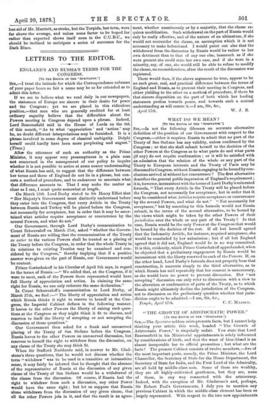WHAT DO WE MEAN?
[TO THE EDITOR OF THE SPECTATOR-"]
SIR,—Is not the following dilemma an accurate alternative definition of the position of our Government with respect to the Congress,—either it requires Russia to admit that no part of the Treaty of San Stefano has any validity, unless confirmed by the Congress ; or that she shall submit herself to the decision of the other Powers at the Congress as to what parts do and what parts (if any) do not require confirmation ; or it will be satisfied with an admission that the relation of the whole or any part of the Treaty to European interests and the Treaty of Paris may be discussed in Congress, without Russia engaging to be bound by con- clusions arrived at without her concurrence ? The first alternative describes the general public impression of England's requirement ; it is, however, inconsistent with the terms of Lord Derby's reiterated formula, "That every Article in the Treaty will be placed before the Congress, not necessarily for acceptance, but in order that it may be considered what Articles require acceptance or concurrence by the several Powers, and what do not." "Not necessarily for acceptance," but by assenting to this formula would not Russia submit, in the terms of the second alternative, to be bound by the views which might be taken by the other Powers of their jurisdiction over the whole or any part of the Treaty ? In that case, Russia would be the only Power at the Congress that would be bound by the decision of the rest. If all but herself agreed that the Indemnity Article, for instance, required acceptance, she would be concluded by her submission ; but if all but England agreed that it did not, England would be in no way committed. It is this, evidently, which Prince Gortschakoff apprehended, when he objected that a preliminary engagement by Russia would be inconsistent with the liberty reserved to each of the Powers. If, on the other hand, Lord Derby's formula does not properly bear that construction, it amounts simply to the third alternative, as to which Russia has said repeatedly that her consent is unnecessary, as she would have no power to prevent discussion. Her "not accepting" discussion can only refer to discussion with a view to the alteration or confirmation of parts of the Treaty, as to which Russia might ultimately decline the jurisdiction of the Congress, not to discussion on the preliminary question whether that juris- diction ought to be admitted.—I am, Sir, &c.,


































 Previous page
Previous page